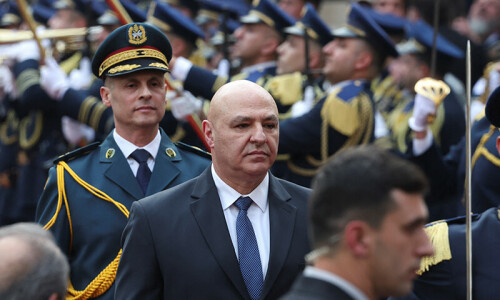KABUL: The Afghan government is expected to finalise a peace deal with a notorious militant insurgent group within days, marking a breakthrough in attempts to end the 15-year war, an official and a representative of the group said on Saturday.
Ataul Rahman Saleem, deputy head of Kabul's High Peace Council, told The Associated Press that the deal with the armed wing of Hezb-i-Islami could be completed on Sunday, after two years of negotiations.
A senior representative of Hezb-i-Islami, Amin Karim, also said he expected President Ashraf Ghani to approve the final version of the agreement on Sunday.
Such a deal would mark a much-needed success for Ghani in forging peace with insurgent groups fighting to overthrow the Kabul administration. His attempts to open a dialogue with the Taliban have failed.
While Hezb-i-Islami has been a largely dormant force in recent years, and has little political relevance in Afghanistan, the deal with the Afghan government could be a template for any future deal with the Taliban.
It commits the group to ending its war against Kabul, respecting the Afghan constitution, and ceasing all contact with other armed, anti-government groups.
Hezb-i-Islami is led by warlord Gulbuddin Hekmatyar, best known for killing thousands of people in Kabul during the 1992-1996 civil war.
Karim has said he is in an unspecified location in Afghanistan. Under the terms of the 25-point agreement, a draft of which has been seen by AP, he could soon return to Kabul to sign a formal peace deal and take up residence.
Hekmatyar, in his late 60s, is designated a “global terrorist” by the United States and blacklisted by the United Nations along with Osama bin Laden. The agreement obliges the Afghan government to work to have the restrictions lifted.
Hezb-i-Islami has only intermittently been active on the battlefield for some time; its last known major attack was in 2013, when at least 15 people, including six American soldiers, were killed in Kabul.
Saleem said Hekmatyar's associates, including his family, all appeared united behind him and “are not dissenting with their leader.”
He said a few points in the agreement were still to be thrashed out, and added: “It is strongly possible that we get to the final points tomorrow and finalise the peace negotiations.”
Negotiations began in July 2014, Karim said, when Hekmatyar received a letter from Ghani, then campaigning to become president, noting that one of Hekmatyar's key conditions for peace - the withdrawal of all foreign troops from Afghanistan - was about to be met.
“That was the beginning,” Karim said.
Progress stalled after President Barack Obama decided to leave a 10,000-strong force in the country through to the end of 2016 until Hekmatyar dropped the condition and renamed it “a goal” earlier this year.
Karim and a number of Afghan officials have said that a peace agreement with Hekmatyar's group could encourage Taliban fighters to end their participation in the war, and eventually lead to a full-blown peace.
Others, however, regard Hekmatyar as politically irrelevant and lacking any real influence. Spokesmen for the Taliban were not immediately available for comment.
The agreement covers a wide range of points, including a guarantee of equality between men and women and respect for the Afghan constitution, both points of contention with the Taliban, whose 1996-2001 rule of Afghanistan was characterised by extremist attitudes that cloistered women in their houses and mandated strict religious education, to the exclusion of almost all else, for boys.
Brokered under the auspices of the High Peace Council - a government body charged with negotiating an end to almost 40 years of war - the agreement allows Hezb-i-Islami to operate as a bona fide political party and participate in elections at every level.
It gives legal immunity for “all past political and military proceedings” by Hezb-i-Islami members and mandates the release of all prisoners within three months. Karim said there are about 2,000 Hezb-i-Islami prisoners in jails across Afghanistan.
The Afghan government undertakes to provide housing and security for Hekmatyar at two or three residences in places of his choosing.
One point that could attract opposition from sections of society that fear Ghani's government is prepared to cede ground to the Taliban in return for peace - including any rollback in rights for women - is a clause that gives Hekmatyar a “consultant” role on “important political and national decisions” facing the government.
For its part, Hezbi-i-Islami pledges to end the war, function as an “active political party,” stop all military activity and dissolve all its military organizations, and cease all contact with other anti-government organizations.














































